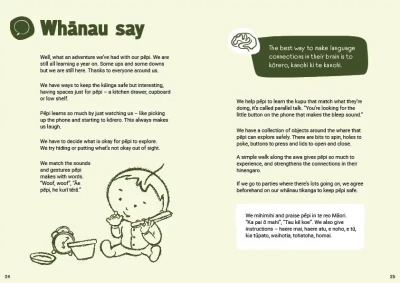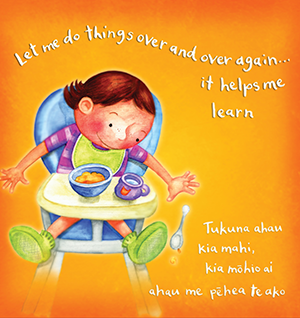
Kitchen drawer a space for baby
Having a special place to keep baby’s things can balance the need for safety with their exploration and play. You could consider new things they might like to play with.
At this time, babies are becoming more mobile, curious and keen to explore what they can grab and mouth. They are beginning to understand about ‘object permanence’, that is, that things can still exist even if they’re out of sight.
A place for baby’s things
Having a special place for baby’s things can help to support both these developmental stages.
In the Whakatipu booklet Te Pihinga 2, page 17, whānau say:
‘We have ways to keep the kāinga safe but interesting, having spaces just for pēpi – a kitchen drawer, cupboard or low shelf.’
Ask whānau:
- Have you thought about a safe and secure baby-friendly space in your home that’s just for baby and their things?
- What might the advantages be?
Some families put a sticker with baby’s name on the cupboard or drawer.
- How does your baby know it’s their space?
Balancing safety and exploration
There’s lots of information about keeping baby safe, but we also don’t want to restrict them from exploring the world. Part of creating a ‘yes’ environment is to let baby have some freedom to explore and play.
Use some of the conversation starters below to encourage whānau to think about what feels right for their family.
- What might baby like about having their own special place?
- How might it help the rest of the family?
- What about when there are other young kids in the whānau –how would that work?
- Let’s have a look around – what might work for you and baby?
- What does it need to be like?
- Why is that?
Look around at what baby can reach and help parents decide if they want those things in reach or not. Maybe parents could put those things up high for a while?
- What are some of the things baby likes to play with that are okay for them to have?
- What are some new things baby hasn’t played with before that they could have?
- Could these things be kept in their special place?
Keeping baby safe at all times
‘Child neglect’ can mean pēpi being left alone for long periods and not interacted with or responded to.
However, there are times when parents have to do things that take them away from their baby. Help parents to think about what might be an acceptable time to leave baby without supervision.
- What do you do when you have to hang out the washing and baby is awake?
- Have you ever left baby alone in the house?
- If you were accidentally locked outside for 10 minutes and baby was left inside by themselves, would they be safe?
Helpful resources for whānau
-

Rethinking the nappy
Brainwave Trust
Miriam McCaleb suggests that simple caring moments can become important times of connection between babies and their whānau.













